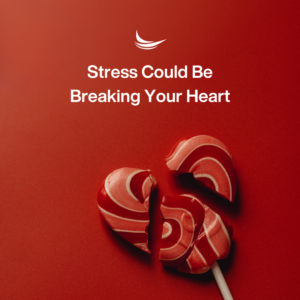Stress Could Be Breaking Your Heart
 Stress affects all systems of the body— musculoskeletal, respiratory, cardiovascular, endocrine, gastrointestinal, reproductive, and nervous systems. Our bodies are designed to respond to stress, but chronic and long-term stress can take its toll on physical and mental health.
Stress affects all systems of the body— musculoskeletal, respiratory, cardiovascular, endocrine, gastrointestinal, reproductive, and nervous systems. Our bodies are designed to respond to stress, but chronic and long-term stress can take its toll on physical and mental health.
The cardiovascular response to stress includes increased heartbeat, stronger contractions of the heart, the release of stress hormones as messengers (adrenaline, noradrenaline, and cortisol), and elevated blood pressure. Vital components of the cardiovascular system include the following:
- Heart
- Blood
- Blood vessels
Effects of chronic stress may include hypertension, high cholesterol, heart attack, or stroke.
Did you know that heart disease is the leading cause of death in the United States?
- Approximately 1 in every 5 deaths is from heart disease (with 1 in every 4 deaths for women).
- Heart disease is the leading cause of death in the United States.
- According to the CDC, over 60 million women (44%) live with some form of heart disease.
I would like to talk about cardiovascular health and the importance of taking loving care of your heart during American Heart Month.
Do you know your risk factors for heart disease? Almost half of Americans have a least 1 of 3 risk factors for heart disease which include high blood pressure, high cholesterol, and smoking.
Women have been identified as a group in which there are health disparities, impacted by the delayed recognition, diagnosis, and treatment of cardiovascular health conditions.
When it comes to physical and mental well-being, there are factors outside of one’s control such as age, race, gender assigned at birth, family medical history, and other factors that are within one’s control such as choosing a heart-healthy lifestyle. The good news is that heart disease can be prevented. Developing healthy routines and lifestyle choices early will make a significant impact on heart health in older adulthood. Now is the time to take action and get started.
A heart-healthy lifestyle includes:
- Getting enough quality sleep
- Balanced and nutritious eating
- Not smoking (or stopping smoking)
- Maintaining a healthy weight
- Getting enough physical activity
It is important to recognize the mind-body connection and address both the physical and emotional components that impact heart health. Working with a mental health professional can help address mental health conditions such as anxiety disorders, depression, chronic stressors, and persistent states such as elevated anger that may raise blood pressure. Your therapist can help work with the body’s fight or flight response activated by stressors, teach relaxation, and stress management strategies, and utilize interventions to process thoughts, feelings, and experiences. Your therapist can also encourage preventative care such as yearly checks for high blood pressure, recommended testing for diabetes, reducing or quitting substance use, taking prescribed medications, and supporting healthy lifestyle changes.
Resources:
National Heart, Lung, & Blood Institute:
American Heart Association:
Center for Disease Control & Prevention:
https://www.cdc.gov/heartdisease/communications_kit.htm
https://www.cdc.gov/dhdsp/programs/spha/index.htm
Office on Women’s Health:
https://www.womenshealth.gov/heart-disease-and-stroke/heart-disease
Written By: Charlotte Johnson, MA, LPCC



























